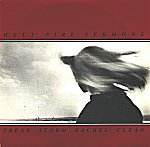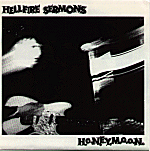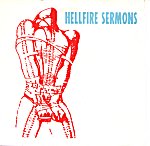 | |

|
I first wrote about the Hellfire Sermons over nine years ago in a fanzine called Pantry For The World. It was a touchy strokey celebratory piece of the 'I know better but the world won't listen' variety; naturally it was over the top, full of underlining, and relied heavily on letting the dots do the talking... I was sore at what I chose to see as the Hellfires being deliberately overlooked. In true outsider style, I took issue with music press hype and abused the then current, overrated and thoroughly orthodox champions, the Stone Roses. Here's a taster:
The Hellfire Sermons. I had a point, even though I myself used what were and still are music press techniques of persuasion. That is, the Hellfires were the best (along with all the other groups that were the best), and anyone that didn't think so was a fool. The world never had to learn to live with - or without - the Hellfire Sermons. While they continued in productive obscurity, travelling from perfect Scouse pop to barbed-wire guitar and bloodcurdling vocals, the Stone Roses did almost nothing for five years, and people bought what they eventually managed to come up with, presumably failing to recognise a group beached by their own success, a group whose only ambition was success. During those five years, my generation of pop obsessives learnt to live with the world, some of us recognising that it was probably better that the Hellfire Sermons were household names in only a very few households. Ironically enough, the Roses were part of a movement in sound that allowed choreographically-challenged pop obsessives to seek out new worlds of rhythm. Along came A Tribe Called Quest and Massive Attack, and we couldn't wait forever for Liverpool's finest, or more accurately, for someone in a position to feel able to take a risk with them. There were too many extremes in existence for all the extremists to unite behind just one. The Mo' Waxers were off headz-hunting, junglists were at the edge on other fronts, guitar innovators were as few and far between as ever, and it was techno-technicians as much six-string purists who were holed up in bedsits, the odd one producing astonishing sounds instead of astonishing songs. It isn't possible to carry on living in bitter defiance of the world and its tastes for long. The exuberance and torment of the time when it was possible fades, it isn't sustainable. I prefer to be sidetracked by new musical challenges and explorations than to worry much or for long about the injustice of it all; most would agree, though with less passion than is utilised for dismissing the likes of Kula Shaker, that there are greater injustices to worry over. So we glory in the disparate nature of music, going both forwards and backwards in time, following as many of the new crossbreeds as possible, over-extending our long-since decibelled hearing, and finding ourselves well on the way to being penniless as well as deaf. And while it's best to remain open-eared as to where the next seismic musical shift will come from, we don't forget to be hugely underwhelmed when we finally get around to hearing the latest favourites, the latest crown princes or princesses of the old tradition. And we know - so why do they keep contending the opposite? - that there will never be another Smiths, just as there has never been another Beatles. (Oasis should never think that they are the new Beatles, let alone this early in their career.) The Hellfires fairly rang with optimism, whatever the lyrical content of their songs. The records, live performances, what we wrote about them to each other and in our fanzines, the not infrequent reviews; the future was as bright as it was supposed to be. What happened? What didn't happen? They had songs enough for as many as three LPs, which will never now be recorded; their musical path is charted only by the occasional single, at an average of less than one a year. The same old story of a group too good, and, though it pains me to believe this was a part of their problem, not handsome enough for this world. Too demanding. Too challenging. And not pushy enough, too unconcerned about making it. A story shared in differing respects and to varying degrees by all the groups who recorded for or were connected with the always inspiring and often magical Esurient label. Emily, the Claim, the Jasmine Minks, the passage of a few people through a rather brief moment of time. Only the Manic Street Preachers, the most unoriginal and traditional of the lot, politicised Iggy Pops, only they made it, if you can call riding on the coat-tails of canonisation success. And yet even they had something, energy and passion in vast supply. This sounds like an obituary - I don't mean it to. The Hellfires are alive and well and (mostly) still living in Liverpool, and they even occasionally come together as old friends to create melodic uproar Sermons-style. With the one evident and debateable exception, doubtless all the other Esurient stars are out there somewhere, perhaps, who can say, one day to return. It actually makes me ache to think how brief a time it was before, for example, Oliver Jackson of Emily disappeared off the pop face of the earth. Ollie's voice was as deep and wide and tall as the deadliest subs in drum and bass, but he could also be almost shy in his delivery. He had the looks of Ryan Giggs and his group were signed to Creation. Alan McGee's biggest mistake - apart from inflicting Oasis on us - was not giving Ollie the time he needed to bring together people who were up to his musical vision. He was the type who couldn't leave his songs alone and kept re-writing them as he moved nomadically through swathes of music past. In producing his incomparably adventurous finished articles, he was considerably helped by drummer Nick, one of the most elaborate tub-thumpers ever. Two singles and an LP, a handful of performances, then gone, no-one knows where. I still maintain that 1989's 'Stumble' is one of the best singles ever, and 'Merry-go-round', the greatest single never released. When they realise their number's up, where do all the unwanted, frustrated stars go? Last I heard of Ollie, he was traipsing round Africa, but that was years ago, and he can't still be there, if he ever went in the first place. Kevin says he occasionally used to bump into Phil Wilson round his neck of the woods. He became a civil servant, and until 1995, when the June Brides briefly resurfaced to promote a compilation CD of their output, firm in his disassociation from the music business. I can't help but find it sad, can't help imposing my own urge and drive onto those defeated souls, who may very well feel more satisfied with their experience than I do. And if, as is now inevitable, the Hellfires remain great unknowns, they will only be another of many, even from the late '80s alone. Grant McLennan once said (more or less),
What matters is that, say, the Claim or the Stars Of Heaven did exist, and were witnessed and respected by a small number of people who spent considerable amounts of time looking for peaks of perfection in the depths of pop. I only hope (will I never learn?) that my new crown princes, the Sunset Sound, don't fall to the same fate. Headed by bass-playing songwriter and orchestrator Jack Boulter, and featuring the impeccable percussive capabilities of Cal Macleod, they shouldn't fail, blending as they do Scouse attitude, West Coast harmonies, and an ear for something well beyond the obvious, which is nevertheless apparently simple once it's been plucked out of musical thin air. Classic songwriting as opposed to innovative soundscaping. To my mind, they would appear to have everything they need on their side to succeed on whatever terms they choose. And like the Hellfire Sermons, they won't be the Smiths, they won't be the Verve, they will just be themselves, and in that they will be no smaller and no bigger than the Beatles.
Freak Storm/Rachel Clean (Hyme, 1987) |



